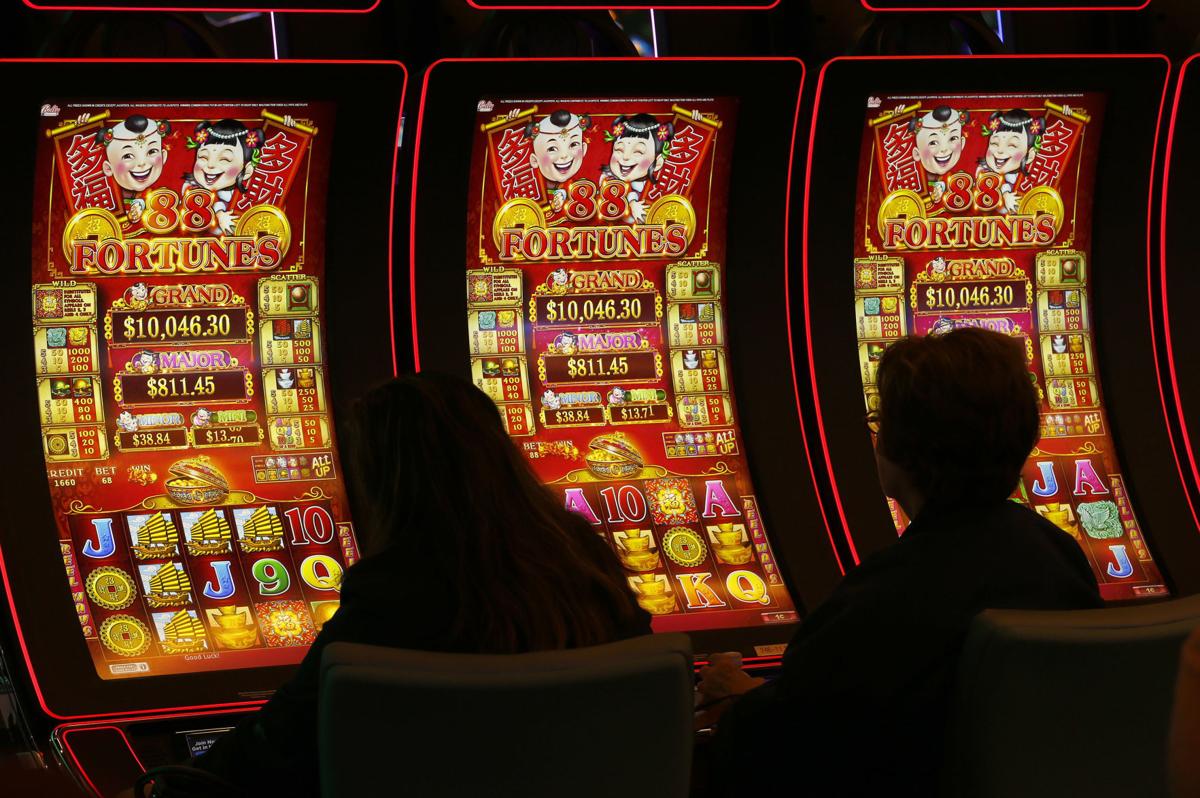PHOENIX — Gov. Doug Ducey agreed Monday to allow full-scale gambling at the Tohono O’odham casino in Glendale, in exchange for a promise the tribe won’t seek more gaming sites in the Phoenix area until after 2026.
The deal officially is between the state and all of the state’s tribes. It offers the tribes some additional gaming opportunities — more poker tables and keno games now and possible additional casinos after 2026 — if they, too, will limit gaming to existing reservation lands until then.
That could help compensate them for revenues they may lose to the Glendale casino, which they have opposed until now.
“The time has come to allow each tribe more freedom in their gaming operations and give every nation the opportunity to have a seat at the table,” Ducey said Monday at an orchestrated mass signing of the deal by 10 tribes.
Notably absent was anyone from the Tohono O’odham Nation, whose West Valley Desert Diamond Casino in Glendale created the legal dispute in the first place. Chairman Edward Manuel would say only that the tribe is reviewing the proposal, which it has had now for only a week.
Kirk Adams, chief of staff to Ducey, said this deal to “modernize” the gaming compacts first authorized by voters in 2002 has been in the works for some time.
But it comes just days before U.S. District Court Judge David Campbell is to hear arguments in the latest dispute between the state and the Tohono O’odham over whether the tribe has the legal right to operate a full-scale casino in Glendale, complete with slot machines and table games.
The O’odham sued after the state denied the permits for full, Class III gaming after claiming the tribe engaged in fraud in 2002 by hiding its plans for the Glendale casino even as state officials and voters were told there would be no new casinos in the Phoenix area.
In the interim, the tribe has opened the casino with Class II slot machines, essentially interconnected instant bingo operations. The tribe wants not only true slot machines but also table games like poker and blackjack.
Federal courts have sided with the tribe in previous lawsuits over the issue.
Gubernatorial legal counsel Michael Liburdi said he was “very confident” the state would win the current lawsuit. Still, he said, it makes sense to settle. “As the governor has said, he’s interested in doing the business of the state with as little legal activity as possible,” Liburdi explained.
“The way we view this is the Tohono O’odham Nation gets what they want: the casino in Glendale,” he said. “Allow them to have what they want and let’s move forward with a new compact where all sides in the state could benefit.”
That benefit is financial.
“It’s about keeping Arizona money in Arizona,” said Navajo Tribal President Russell Begaye. He said more gaming opportunities in-state, including more table games and possibly more casinos after 2026, means fewer people going to Las Vegas or Laughlin, Nevada.
That aids not only the tribes but also the state, which has a tribal gaming revenue-sharing agreement that now brings in about $100 million a year.
Mesa Mayor John Giles cheered the deal.
He said the original 2002 deal included what voters believed was a promise that casinos would be limited to existing reservations. But that premise was undermined by the fact the O’odham took advantage of a little-known provision in the pact to buy land near Glendale, have it made part of its reservation and construct the casino there.
“It settles some uncertainty a lot of the communities have felt in watching the events in Glendale,” Giles said. “There’s some nervousness that we might see casinos unexpectedly appear in other parts of the valley.”
That fear also exists for other tribes in the Phoenix area, who compete for the same gaming dollars and who have fought the O’odham casino in court and in Congress for years. The deal allows the Glendale casino to remain, with an assurance there won’t be more, at least not before 2026.
While it appears to give the Tohono O’odham Nation what it wants, the tribe remains leery after years of legal spats. Manuel, in his response, specifically noted that Ducey’s office did not notify tribal officials of the proposal until last week.
“The lack of communication on this important issue is a concern,” Manuel said. But he said the tribe “stands ready to consider compact amendment language that would resolve the outstanding litigation.”
Representatives of 10 other tribes, including those who have been involved in prior litigation with the Tohono O’odham, showed up Monday to sign the deal and apparently are willing to settle.
One sweetener includes an extra five gaming tables for poker or blackjack on top of the 100 already permitted for tribes in the Phoenix and Tucson metro areas; those in rural areas remain limited to 75. And there are two additional keno games per casino, double the existing number.
But the real benefit could be long-term.
Now, 16 tribes operate 23 casinos, each with a limited number of devices. What Ducey essentially is offering is the possibility of more sites, machines and tables in the future.
That was enough to get the support of the Gila River Indian Community which, with the closest casino to West Valley Desert Diamond, has been its biggest foe. Tribal Gov. Stephen Lewis called the offer of expanded gaming “the opportunity to see a substantial return for having kept our promise to Arizona’s voters and leaders.”
Even non-gaming tribes might benefit: Hualapai Chairman Damon Clarke noted the law allows his tribe to make money by selling its rights to its gaming machines to other tribes.
There are other issues remaining, however, including the delays by the state in acting on the O’odham request for a liquor license at the Glendale facility.





